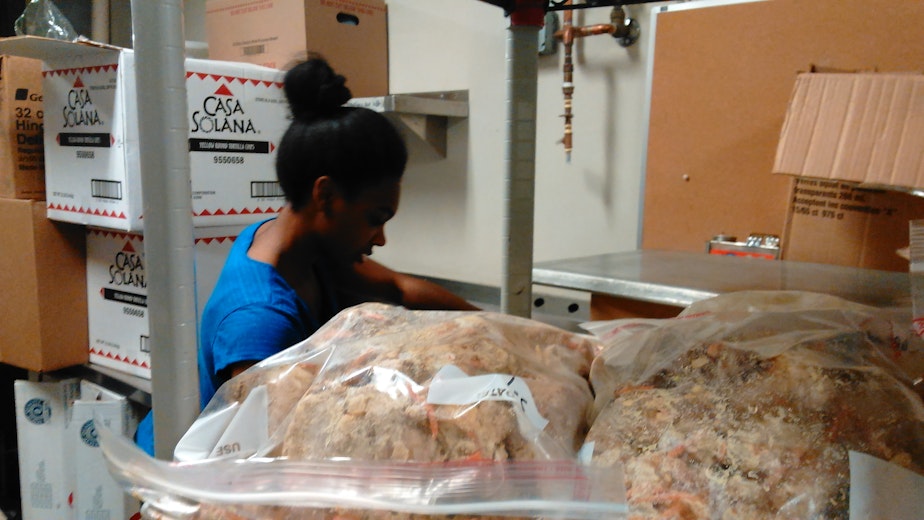Washington Universities Feed People, Not Trash Cans

Food waste — we all do it. We put that bag of spinach in the back of the fridge and forget about it. We make a casserole big enough to feed an army and never eat the leftovers.
Now multiply that waste by thousands. That's what was happening at Seattle Pacific University. Nearly 100,000 pounds of food went uneaten every year.
Maya Swinehart decided to do something about it.
Swinehart worked in the kitchen at Seattle Pacific University when she was a freshman. Every day she saw perfectly good food being thrown out.
“These trays were almost completely full of food. Vegetables, pies, chicken, meat — just completely full and we were just having to shovel it into the trash cans,” Swinehart said.
“And it was upsetting to me, the combination of knowing that downtown, right down the street from SPU, there's so many people on the street begging for food, begging for money, begging for shelter and we have all of this food right here going into the trash cans.”
Swinehart wanted to find a way to save all that wasted food. And she decided that it could help Seattle’s homeless.
“The trash cans don’t need the food and there’s always hungry people somewhere that could use the food.”
But it's not that easy. There are food safety and liability issues. Swinehart ended up spending the next two and a half years setting up a safe and reliable food recovery program.
“This isn't dumpster diving, this isn't taking the food that's already been touched by the students. This is the food that has remained in the warmers or in the coolers; it for some reason was over-produced, it cannot be served again so it would otherwise have to go into the trash,” Swinehart said.
The SPU food recovery program is certified by a national organization called the Food Recovery Network. There are protocols for how to store and deliver the food. Everything gets labeled, weighed and recorded before it goes out the door.
The food then goes to one of several organizations working with the SPU program.
Joe Huppert is with Food in Motion, a program that feeds about 500,000 homeless people each year. He picks up and transports the food from SPU.
He said the SPU program is making a big difference to the people they serve, mainly because it provides good quality meals.
“It’s always a morale thing. The better food they get, the more morale they have, the better hope they can have to get through the day, which is always a good thing to see,” Huppert said.
Since starting in January, the SPU food recovery program has saved nearly 2,000 pounds of food.
But homeless advocates say the need in our community is immense and it will take many more programs like this to meet that need.
SPU is the first private school in Washington state to have a food recovery program. But they're not the only ones doing this.
The University of Washington and Western Washington University are also chapters of the Food Recovery Network, as are several Seattle businesses.
Swinehart is hoping that list will grow and other universities and companies will get on board.
“We waste so much food: restaurant settings, home settings, grocery store settings – food is rejected from the shelves just because it looks a little weird," Swinehart said. "I think that if there is food waste occurring it should be channeled into these types of programs.”
